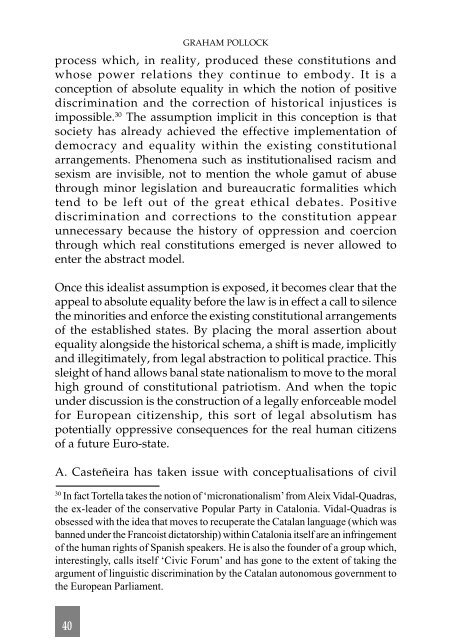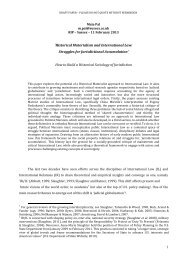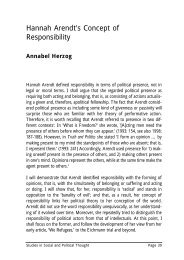Civil Society Theory and Euro-Nationalism - University of Sussex
Civil Society Theory and Euro-Nationalism - University of Sussex
Civil Society Theory and Euro-Nationalism - University of Sussex
Create successful ePaper yourself
Turn your PDF publications into a flip-book with our unique Google optimized e-Paper software.
40<br />
GRAHAM POLLOCK<br />
process which, in reality, produced these constitutions <strong>and</strong><br />
whose power relations they continue to embody. It is a<br />
conception <strong>of</strong> absolute equality in which the notion <strong>of</strong> positive<br />
discrimination <strong>and</strong> the correction <strong>of</strong> historical injustices is<br />
impossible. 30 The assumption implicit in this conception is that<br />
society has already achieved the effective implementation <strong>of</strong><br />
democracy <strong>and</strong> equality within the existing constitutional<br />
arrangements. Phenomena such as institutionalised racism <strong>and</strong><br />
sexism are invisible, not to mention the whole gamut <strong>of</strong> abuse<br />
through minor legislation <strong>and</strong> bureaucratic formalities which<br />
tend to be left out <strong>of</strong> the great ethical debates. Positive<br />
discrimination <strong>and</strong> corrections to the constitution appear<br />
unnecessary because the history <strong>of</strong> oppression <strong>and</strong> coercion<br />
through which real constitutions emerged is never allowed to<br />
enter the abstract model.<br />
Once this idealist assumption is exposed, it becomes clear that the<br />
appeal to absolute equality before the law is in effect a call to silence<br />
the minorities <strong>and</strong> enforce the existing constitutional arrangements<br />
<strong>of</strong> the established states. By placing the moral assertion about<br />
equality alongside the historical schema, a shift is made, implicitly<br />
<strong>and</strong> illegitimately, from legal abstraction to political practice. This<br />
sleight <strong>of</strong> h<strong>and</strong> allows banal state nationalism to move to the moral<br />
high ground <strong>of</strong> constitutional patriotism. And when the topic<br />
under discussion is the construction <strong>of</strong> a legally enforceable model<br />
for <strong>Euro</strong>pean citizenship, this sort <strong>of</strong> legal absolutism has<br />
potentially oppressive consequences for the real human citizens<br />
<strong>of</strong> a future <strong>Euro</strong>-state.<br />
A. Casteñeira has taken issue with conceptualisations <strong>of</strong> civil<br />
30 In fact Tortella takes the notion <strong>of</strong> ‘micronationalism’ from Aleix Vidal-Quadras,<br />
the ex-leader <strong>of</strong> the conservative Popular Party in Catalonia. Vidal-Quadras is<br />
obsessed with the idea that moves to recuperate the Catalan language (which was<br />
banned under the Francoist dictatorship) within Catalonia itself are an infringement<br />
<strong>of</strong> the human rights <strong>of</strong> Spanish speakers. He is also the founder <strong>of</strong> a group which,<br />
interestingly, calls itself ‘Civic Forum’ <strong>and</strong> has gone to the extent <strong>of</strong> taking the<br />
argument <strong>of</strong> linguistic discrimination by the Catalan autonomous government to<br />
the <strong>Euro</strong>pean Parliament.
















